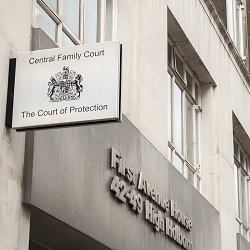A law firm has had to take civil action against the father on the opposite side of a child contact dispute because of the abuse he has directed at it and the solicitor running the case.
His abusive comments towards the mother, her family, other professionals and court staff as well mean he should not be allowed to see his son for now, a judge has ruled.
Her Honour Judge Lynn Roberts said it was clear that no court could order contact between ‘Mr B’ and his 18-month-old child “because it would not be safe to do so”.
In addition to verbal and written abuse towards the mother and her family, she said the court, Cafcass, the local authority and Morrison Spowart, the mother’s solicitors, have received “many, many abusive messages” from him.
Sitting in the Central Family Court, the judge described Morrison Spowart as “a firm with the highest reputation in this kind of work” and solicitor Natasha Owen as also “highly regarded in the family law world”.
But Mr B has put “offensive, abusive, and untrue posts on social media about the firm”, accusing it and Ms Owen of lying and being incompetent. He has also sent “the most offensive emails to Ms Owen personally”.
HHJ Roberts said. “I am told that Morrison Spowart have instituted civil proceedings against him and in those proceedings he gave an undertaking in relation to his aggressive and slanderous behaviour but he does not appear to have complied with that.”
He had given various undertakings to the court during the Family Court proceedings, such as not to post on social media any information about the mother and her family, but again failed to comply. He continued to send abusive messages to Morrisons Spowart and Ms Owen as well.
The judge said a two-day fact-finding hearing listed for September to determine the mother’s allegations against Mr B in relation to his application for child arrangements was unnecessary.
“Mr B’s behaviour towards Ms D and her family and towards everyone else involved, however peripherally in this case, continues to be so abusive that it is unnecessary to have a trial to determine the specific allegations…
“I am sure that no court could order contact, supervised or unsupervised, between Mr B and P because it would not be safe to do so…
“I am also of the view that continuation of these proceedings is allowing Mr B another way of subjecting Ms D and her family to further abuse.”
HHJ Roberts made an order under section 91(14) of the Children Act 1989 that Mr B may not, for a year, apply for an order of any kind in respect of the child without first obtaining her permission.
Any such application “is likely to be considered more favourably if he has, in the meantime, accessed some medical or therapeutic help and not engaged in abusing the mother or her family, or her solicitor, or any of the other professionals and court staff involved”.
The judge noted the mother alleged that Mr B had made “very serious threats” which resulted in a panic alarm and a fire box being installed in her property. But for the purposes of the judgment, she concentrated on Mr B’s verbal and written abuse.













Leave a Comment